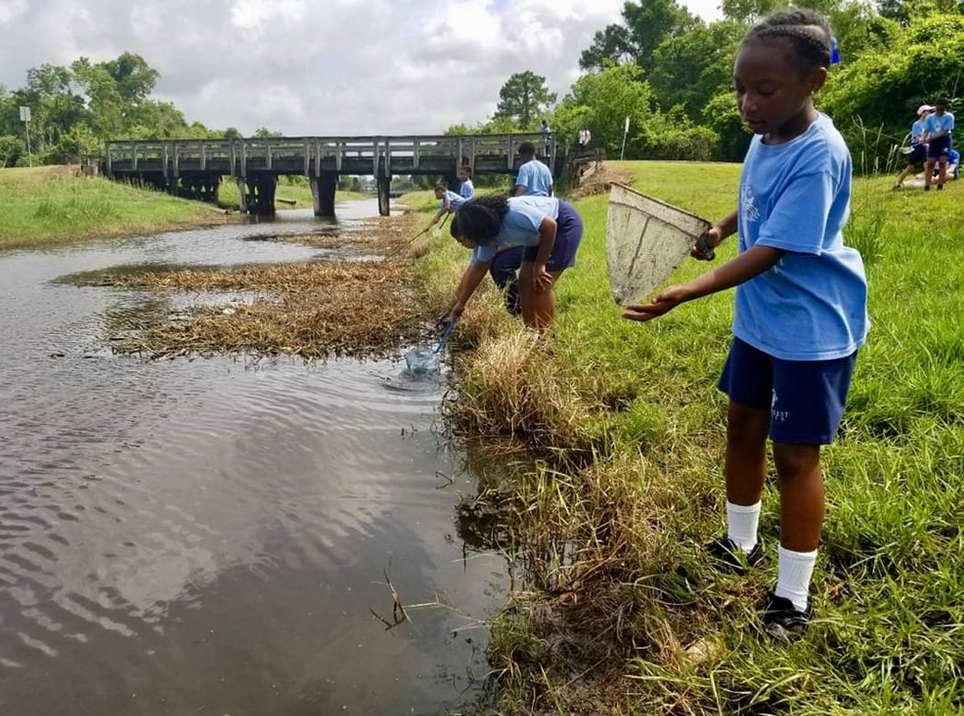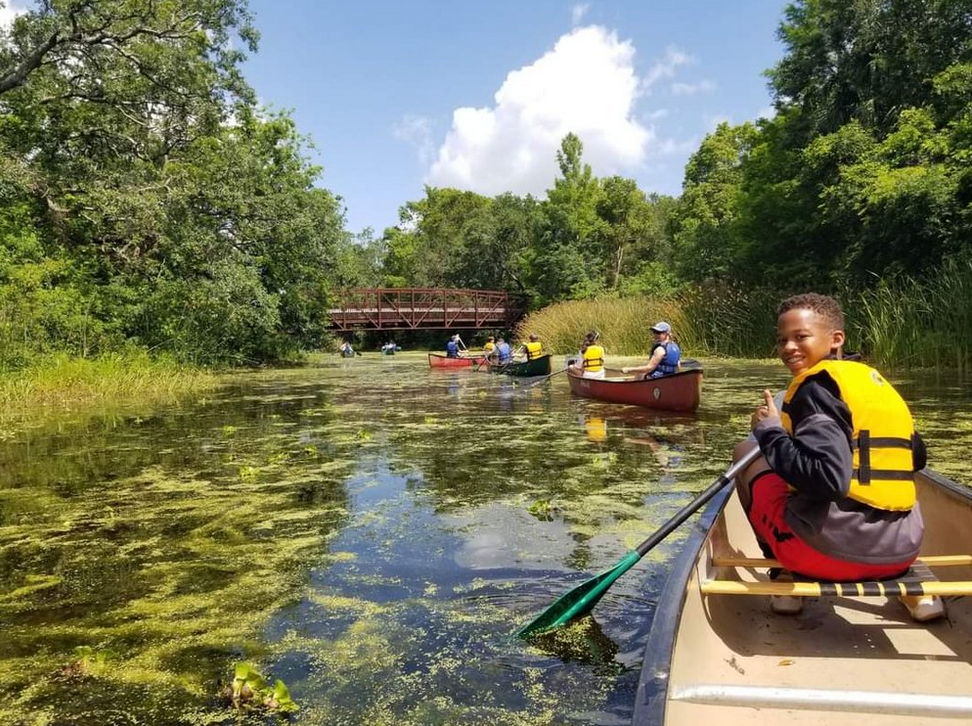By: Luke Paradis, Carly Harris, Julia Kepes, and Ethan Nestlebaum
While technology continues to amaze and exceed our societal expectations, it seems to tighten its grasp on our free time and attention by the day. LOOP NOLA is a non-profit Louisiana outdoor outreach program, whose mission is “to provide positive, life-changing outdoor experiences for children and youth in Greater New Orleans.” “LOOP NOLA addresses the lack of opportunity for urban children to experience the outdoors” (LOOP NOLA).
LOOP’s executive director, Heather West, helped to further explain the focus of the organization, which is to provide outdoor experiences to students who are not afforded with the same opportunities as their peers. As detailed by their website, children ages 6-19 from historically underserved communities are the primary participants with LOOP NOLA, and a significant portion of these children struggle with physical or mental disabilities. As their general goal, LOOP NOLA attempts to make the outdoors and recreational activities more equitable while also prioritizing the youth of color who have been historically marginalized in New Orleans and surrounding areas. LOOP is an organization that seeks to protect and nurture those who are not provided with the opportunities that every child should be given, and they seek create lasting and meaningful memories and relationships in the process. In short, the organizations goal is “to inspire youth to create a new vision for their lives and actively pursue it.”

Children catching critters in a river (Photo by: LOOP Nola).
In light of the fact that many students have little to no experience with formal/structured outdoor or recreational activities, LOOP NOLA seeks to create memories and relationships through the utilization of their expansive outdoor resources. While the numerous activities — rope courses, organized camping, fishing, hiking, and more — all serve to benefit their participants, LOOP NOLA stands out from similar organizations because of their specific focus on psychological perspectives such as social-emotional learning. All this being said, in an ever-advancing technological age, one should not ignore the importance of a child’s emotional and physical growth, and dedicating time to being outside and engaging in physical activity is essential to that.
In Martin Rasmussen and Karin Laumann’s journal article, “The Academic and Psychological Benefits of Exercise in Healthy Children and Adolescents” (2012), the authors illustrate the importance of exercise and general activity in the most integral stages of children’s lives. Their findings were quite clear, attributing numerous benefits to exercise and general outdoors time. One of the main conclusions was regarding the impact on a child’s cognition, which is “measured through creativity, concentration, attention, and memory” (Rasmussen and Laumann 2012). Generally, things like emotion and mood were positively impacted, and there were no negative effects on academic performance or other personal factors/characteristics.
Similarly, Kathy Kinser’s article, “Fresh Air, Fun, and Exploration: Why Outdoor Play Is Essential for Healthy Development,” illustrates the necessity of outdoor time in a child’s development. Kinser describes a large variety of benefits to outdoor play, all of which collectively encompass the necessary aspects of healthy development. For example, Kinser emphasizes a flourishing of interest in science and STEM as a result of spending time outdoors. In addition to inviting children to learn more about the natural world, spending time outside also grounds them in the real world. This is because the outdoors is the place find evidence for topics that these children may have only been reading about. Kinser also details the psychological benefits of spending time outdoors; Outdoor activities provide opportunities for socialization and collaboration and provide new contexts for learning. The outdoors provides opportunities to problem-solve, take risks, and discover – all of which are positive inclusions to a child’s development.

Children canoeing with LOOP Nola (Photo by LOOP Nola).
Finally, Kinser illustrates a few physical benefits of outdoor play. Moreover, she posits that achieving better sleep is one of the major benefits of spending time in nature (Kinser 2019). Interestingly enough, a “prescription for play” is suggested by the American Academy of Pediatrics upon every well-child visit up until the age of 2 years. Similarly, the Nemours Health and Prevention Services recommends “daily, supervised outdoor time for children from birth to age 5 (Rasmussen and Laumann 2012).” Nemours Health and Prevention Services also encourages parents to give their toddlers at least 30 minutes of structured (adult-led) physical activity and at least 60 minutes of unstructured (child-led) physical activity each day. As children get older, recommendations increase by time and independence level. To support this advice, prior research shows that, “older children are more attentive and productive in the classroom when recess—indoors or outdoors—is part of the school day” (Kinser 2019).
On another note, Heather West further explained to us the mission at LOOP NOLA, outlining the specific focus and importance of social-emotional learning in the context of outdoors. She illustrated the following: “So I guess a brief explanation of what social-emotional learning is, obviously, on the flip side of that when kids go to school, there are educational standards that they’re expected to meet. They must learn x, y, z, take a test to prove that you know it, and that happens all throughout school. Social-emotional learning focuses on the other side of that. It focuses on people skills and learning how to work together and problem solve — basically anything that comes together as an interpersonal skill. As y’all know, when you enter the working world and become an adult, and things like that, you better have some interpersonal skills or things will not go smoothly.”
The general objective at LOOP is proved to be significant by numerous studies that demonstrate that spending time outdoors is beneficial to the socialization of children. From team-building and collaboration to risk-taking and exploration, LOOP helps offer opportunities to those who perhaps normally would be given little choice to begin with. By providing comprehensive, continuous methodologies and programs catered specifically to nurturing social-emotional skills, communication development, improved physical and mental health, academic achievement, and more, LOOP NOLA can be acknowledged as an integral institution for the growth of the current youth.
To hear more about LOOP and what they stand for, check out an interview with director Heather West: Interview With Heather West (4/10/23)

(Location of LOOP NOLA)
This piece was edited by Eliza Griggs as part of Professor Kelley Crawford’s Digital Civic Engagement course at Tulane University.
 NOLAbeings
Multimedia artist Claire Bangser created NOLAbeings as a portrait-based story project that marries...
NOLAbeings
Multimedia artist Claire Bangser created NOLAbeings as a portrait-based story project that marries...
 Data corner: Adobe Suite (create a PDF, social media graphic, presentation, edit a photo and video
Data corner is where you go to work with analytics and top tech skills. It takes on everything from PERL and SQL to Canva and Sprout Social.
Data corner: Adobe Suite (create a PDF, social media graphic, presentation, edit a photo and video
Data corner is where you go to work with analytics and top tech skills. It takes on everything from PERL and SQL to Canva and Sprout Social.
